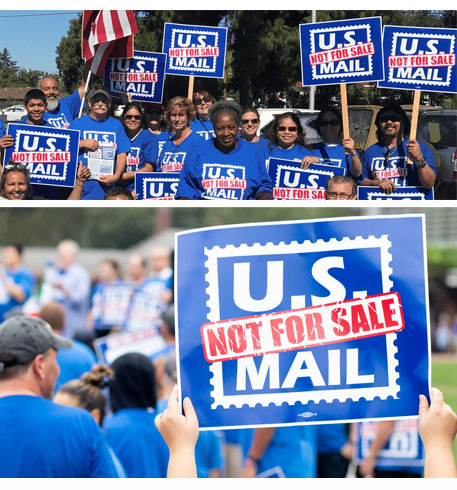 The Trump administration’s task force on the U.S. Postal Service finances released its long-awaited reportand recommendations. While it didn’t call for full-scale privatization of the USPS as some had feared, it called for dramatic service cuts, price increases, and failed to address the biggest challenge facing USPS finances: an unreasonable demand that it pre-fund all retiree benefits.
The Trump administration’s task force on the U.S. Postal Service finances released its long-awaited reportand recommendations. While it didn’t call for full-scale privatization of the USPS as some had feared, it called for dramatic service cuts, price increases, and failed to address the biggest challenge facing USPS finances: an unreasonable demand that it pre-fund all retiree benefits.
In response to the report’s release, the following statement was released Tuesday by Mark Dimondstein, President of the American Postal Workers Union:
If the White House Task Force on the Postal Service’s report was assigned a ZIP Code it would be 00000. This poorly conceived report makes many of its recommendations based on myth and misinformation that instead of improving mail services, would deliver higher prices and less service for the public.
The facts are: The public Postal Service serves each and every person. According to recent surveys by Gallup and the Pew Research Center, it enjoys the highest level of satisfaction and trust of any government service or agency. The United States has the lowest postage rates in the industrialized world. USPS doesn’t take a penny in tax dollars and under the universal service mandate delivers to 157 million addresses six days a week at affordable prices.
This report calls for slashing universal service. Recommendations would slow down service, reduce delivery days and privatize large portions of the public Postal Service. Most of the report’s recommendations, if implemented, would hurt business and individuals alike.
No institution is better suited for the ecommerce revolution than the USPS. This is why some on Wall Street and their enablers on this task force want to position the Postal Service for sale to private interests. The recommendations of the task force are not in the public interest. Our union will continue to strongly advocate for a robust public Postal Service and the rights of the hundreds of thousands of dedicated public servants who move the mail every day.
 Here is the posted by the National Association of Letter Carriers following the postal report’s release:
Here is the posted by the National Association of Letter Carriers following the postal report’s release:
Today, the Trump administration’s task force released its report evaluating USPS finances and operations, United States Postal Service: A Sustainable Path Forward. Due to the White House on August 10, the administration sat on the report for nearly four months, leaving both the Postal Service and Congress to delay meaningful action on addressing core issues in order to wait for these recommendations.
Although NALC is still studying the report and will report on its details in greater detail, NALC President Fredric Rolando called the report “a huge missed opportunity filled with legislative recommendations that are likely to be dead on arrival in Congress.”
Rather than fully addressing the artificial financial crisis caused by the 2006 retiree health pre-funding mandate enacted by Congress in 2006, the report launches an all-out attack on the collective bargaining rights of postal employees – calling for the revocation of the right to negotiate wages by America’s postal unions.
“NALC totally rejects this attack on hard-working American workers and we are confident that bipartisan majorities in both houses of Congress will too,” Rolando said.
The report also calls for massive service cuts – allowing USPS to reduce the frequency and quality of delivery services, which would result in huge job losses for city letter carriers. It also advocates forcing the Postal Service to dramatically raise prices for the delivery of packages, the fastest growing and highly profitable segment of the Postal Service’s volume. Indeed, an industry coalition representing package shippers, the Package Coalition, warned that the recommendations would “limit access and raise prices” on package delivery, harming consumers and the Postal Service alike.
The good news is the report does not expressly call for the privatization of the Postal Service, though it does highlight the privatization of postal systems such as Germany and New Zealand. “This is a victory for the public and the NALC,” President Rolando said. “Our efforts to mobilize the public and a majority of Congress to oppose privatization and to support H.Res. 933 and S. Res. 633 have paid off.”
But he added: “This report, particularly in its suggestions for regulatory and administrative changes, poses a serious threat to affordable universal service. We will remain vigilant and fight any efforts to damage the public interest in such service.”
Another positive in an otherwise disappointing report, was the Task Force’s apparent embrace of the postal workforce’s proposal to reduce the retiree health pre-funding burden by limiting the amount to be pre-funded to the actual vested liability for such benefits (recommendations viewable here). NALC urges Congress to adopt this proposal before the current Congress ends.
“The delay of this long-overdue report has resulted in another missed opportunity in the 115th Congress to advance real measures that would strengthen the Postal Service and return financial stability to this agency,” Rolando said. “NALC is committed to restoring USPS to financial stability while protecting its employees and strengthening the universal mail delivery network.”
NALC will thoroughly review this report and provide its feedback to Congress and the administration while keeping letter carriers aware of any updates.
